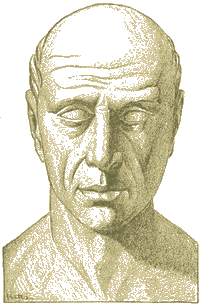 "WHILE there's life, there's hope." Probably every English speaking person has used or at least heard that expression at some time. Not one in a hundred, or even in a thousand, very likely, knows that it first saw the light of day in the works of the Roman dramatist posterity knows simply as Terence. It is only one of dozens of similar quotations, so familiar as to have become proverbial, all of which first heard on the Roman stage.
"WHILE there's life, there's hope." Probably every English speaking person has used or at least heard that expression at some time. Not one in a hundred, or even in a thousand, very likely, knows that it first saw the light of day in the works of the Roman dramatist posterity knows simply as Terence. It is only one of dozens of similar quotations, so familiar as to have become proverbial, all of which first heard on the Roman stage.
The Roman comedy writer, Terence, was of African descent. He was brought to Rome as a slave by the Roman Senator, Terentius Lucanus, who gave him a good education and finally freed him. The success of his first play, staged in 166 B.C. gave him the opportunity of introduction into the most refined society in Rome. Here his engaging manners and accomplishments made him a prime favorite.
Terence's dramatic work was of two kinds: fairly close translations of the later Greek comedy writers, especially Menander; and "contaminations" which is the term used in referring to an amalgamation of all or parts of two or more Greek dramas into a Romanized whole. By some happy chance six of Terence's comedies were preserved through the Dark Ages and later were studied by some of the greatest playwrights, particularly by Molière. The extant plays are: Andria, Hecyra, Heautontimoroumenos, Eunuchus, Phormio, and Adelphi. The latter play, probably a sort of rehash of both Diphilus and Menander, is best known.
Since Plautus and Terence are practically the only Roman dramatists, if one excepts the "closet" dramas of Seneca, it is natural that the work of the two should be rather critically compared. Terence is undoubtedly inferior to Plautus in comic power. The swift-moving action and vigor of Plautine comedies, too, are lacking in the plays of Terence. He is, however, more than a match for his predecessor in consistency of plot and characterization. "Plautus was the practical playwright; Terence, the elegant literary craftsmen." [1] Plautus was the playwright of the masses; Terence, of the classes.
In 158 B.C. Terence departed on a trip to Greece to study the comedies of Menander, Diphilus and Apollodorus against their native background. He never returned and tradition says he was drowned.
Purchase Plays by Terence